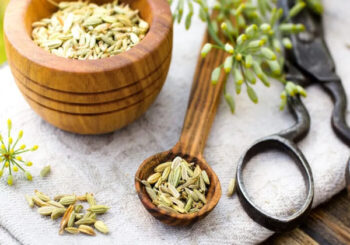Contributing writer for Wake Up World
Chewing fennel seeds after a meal is a common practice in many parts of the world, including southeast Asia. The seeds, with their licorice-like flavor, are a featured ingredient in the Indian Ayurvedic snack mukhwas, which is traditionally eaten after a meal to freshen breath and aid digestion.1
[pro_ad_display_adzone id=”110028″]
Considered “one of the world’s oldest medicinal herbs,” fennel (Foeniculum vulgare) has anti-inflammatory and antipathogenic properties,2 and is among the richest plant sources of potassium, phosphorus, calcium and fiber.3 As part of the Apiaceae family, fennel is related to cumin, dill, caraway and anise. Fennel “seeds,” also known as saunf, are actually the plant’s dried, aromatic fruit, known to have pain-relieving, fever-reducing and antioxidant properties.4
But their greatest claim to fame lies with their use as a natural remedy for digestive disorders, including heartburn, bloating, gas and even chronic conditions like inflammatory bowel disease (IBD).5
Fennel Seeds for Inflammatory Bowel Disease
An estimated 3 million (or 1.3%) of U.S. adults suffer from IBD, which includes Crohn’s disease and ulcerative colitis.6 A CDC study revealed that from 2001 to 2018, the prevalence of IBD among 25.1 million Medicare beneficiaries aged 67 years or older increased among all racial/ethnic groups.7
In Iran, fennel is a popular complementary and alternative treatment for IBD,8 which involves chronic inflammation of the small and/or large intestines. In the intestines, a barrier exists between epithelial cells to protect against foreign antigens, but in IBD, this barrier is compromised.
“The cytokines present in IBD damage the intestinal barrier, resulting in clinical and pathologic manifestations including mucosal friability, decreased tissue resistance, and increased paracellular permeability,” researchers explained in PLoS One.9 They conducted a study showing that fennel seed extract improves barrier function in the gastrointestinal tract, “suggesting the potential utility of this agent as an alternative or adjunctive therapy in IBD.”10
Fennel, which also has antispasmodic and carminative, or flatulence-relieving, effects, may also be useful for irritable bowel syndrome (IBS). When combined with curcumin, fennel essential oil significantly improved symptoms, including abdominal pain, and quality of life in IBS patients over a 30-day period.11
Fennel’s Flavor Comes From Health-Boosting Anethole
Anethole is the primary bioactive compound in fennel, which is responsible for its unique flavor. It has an impressive array of beneficial properties, including anti-inflammatory, anticarcinogenic, chemopreventive, antidiabetic, immunomodulatory, neuroprotective and antithrombotic effects.12
It also has gastroprotective properties, and in a study on mice with colitis, anethole relieved colitis symptoms by reducing oxidative stress and the inflammatory response.13 Anethole may also help with appetite control and may explain why fennel helps prevent weight gain.14 Fennel seeds also contain about 50% fiber, which helps increase feelings of fullness, however even fennel essential oil has been found to help with appetite control.15
A study published in Clinical Nutrition Research also found that overweight women who drank fennel and fenugreek tea before a lunch buffet felt less hungry and consumed less food.16 In fact, in ancient Greece, fennel was known as Marathon, which comes from the word Mariano, or “to grow thin.” They used the plant to suppress appetite for weight loss or during times of famine.17
Fennel Is Useful for Colic
Among children, fennel seed oil emulsion has also been shown to effectively decrease the intensity of colic, and is known to reduce intestinal spasms.18 In one study of parents who used a fennel-based herbal treatment to soothe colic, which is characterized by inconsolable crying, in their infants, 65% reported rapid symptom reduction.19
After just 30 minutes, those parents reported “meaningful improvements” in up to 79% of symptoms. Constipation and diarrhea were also reported significantly less often in babies who received the fennel herbal product. Fennel’s beneficial compounds can also pass through breastmilk, so breastfeeding mothers who consume fennel seeds may help to naturally relieve colic in their infants.20
Why It Makes Sense to Chew Fennel Seeds After a Meal
Compounds in fennel essential oil help regulate the motility of smooth muscles in the intestine and reduce gas at the same time.
[pro_ad_display_adzone id=”110030″]
“Alone, or combined with other plant medicinals, Foeniculum vulgare is indicated in the treatment of spastic gastrointestinal disturbances, in some forms of chronic colitis (which resist other treatments), in dyspepsias from gastrointestinal atony, in dyspepsias with the sensation of heaviness in the stomach, and so forth,” researchers explained in BioMed Research International.21
In a review of fennel’s health properties, they found clinical trials validated traditional uses of fennel for a number of gastrointestinal issues, including abdominal pain, constipation, diarrhea, flatulence, gastritis, irritable colon, stomachache and more.22
Phytochemicals in fennel, including volatile compounds, flavonoids, phenolic compounds, fatty acids and amino acids are thought to be responsible for the plant’s wide-reaching benefits, but they added:23
“Fennel also contains mineral and trace elements like … barium, calcium, cadmium, cobalt, chromium, copper, iron, magnesium, manganese, nickel, lead, strontium, and zinc; fat soluble vitamins such as vitamins A, E, and K; water soluble vitamins like ascorbic acid, thiamine, riboflavin, niacin, and pyridoxine; essential amino acids like leucine, isoleucine, phenylalanine, and tryptophane may contribute to the myriad health beneficial effects at least in part.”
‘One of the Most Effective Digestive Aids’
The Northwest School for Botanical Studies also counts fennel as “one of the most effective digestive aids,” calling out its gas-relieving antispasmodic and stomachic — or beneficial to the stomach — properties.24 In a monograph on fennel, it’s explained how various parts of the plant come together to form a near-perfect herb for digestive health:25
“It [fennel] is highly beneficial to reduce digestive cramping, gas, and bloating. The volatile oils contained in the seed stimulate the mucus membranes in the digestive tract, encouraging motility and peristalsis. The aromatic oils also exert smooth muscle antispasmodic and carminative actions.
The seed tincture or tea is effective for treating intestinal spasms that result from conditions such as irritable bowel syndrome, ulcerative colitis, Crohn’s disease, leaky gut syndrome, Celiac disease, and intestinal candidiasis.
Fennel’s properties pass through breast milk, reducing infant colic. Fennel seed has anti-nauseant properties, aiding recovery from stomach flu, food poisoning, digestive infections, and hangovers. It anesthetizes pain resulting from a hiatal hernia and indigestion. Fennel decongests the liver and is a useful adjunct for conditions arising from liver stagnation.”
Fennel Relieves Menstrual Cramps as Well as NSAIDs
There are other uses for fennel, too, including as a remedy for painful menstrual cramps. In a study of 60 college students, ages 18 to 25 years, suffering from cramps, the authors explained fennel contains “antispasmodic and anethol agents that may be helpful for the management of primary dysmenorrhea.”26
The participants were divided into two groups and followed for two cycles. At the onset of pain, one group received 25 drops of a 2% fennel-containing solution every six hours. If pain was not reduced within two hours, they also received 250 milligrams (mg) of mefenamic acid, an NSAID, in capsule form. The control group received only 250 mg of mefenamic acid, also in capsule form, every six hours, as needed.
After comparing the two groups, the researchers asserted, “The present study showed the efficacy of fennel drops in pain relief for primary dysmenorrhea is comparable to the efficacy of common NSAIDs such as mefenamic acid capsules.”27 In a separate study involving 110 high school girls, mean age 13 years, fennel was also found to be as effective as mefenamic acid for relieving pain associated with menstrual cramps.28
Fennel Is Good for Oral Health, Too
Chewing fennel seeds is a natural way to freshen your breath, while the anethole they contain may have a potent inhibitory effect on periodontitis.29 Fennel seeds also have antimicrobial effects and chewing them increases the pH of saliva, which may help fight cavity development.30
“If the salivary pH is <5.5 (critical pH of dental enamel) then the mineral contents of dental enamel tend to dissolve,” researchers noted in the Indian Journal of Dental Research.31 They believe anethol in fennel seeds increases the salivary flow rate, while another compound in the seeds — fenchone — has additional medicinal properties.
Separate research found similar effects on salivary pH from chewing fennel or cardamom seeds, noting, “Chewing both fennel seeds and cardamom seeds are equally effective in increasing salivary and plaque pH. Both the seeds can be used to lubricate and moisten the mouth, while at the same time providing caries protection to highly susceptible individuals.”32
It’s Easy to Grow Your Own Fennel
If you’d like a fresh, convenient source of fennel seeds to chew after meals or if you’re feeling bloated, crampy or gassy, it’s easy to grow fennel at home. The seeds can be started indoors or planted directly outside. Just keep in mind that fennel tends to seed surrounding areas, so if you don’t want it to spread too much, plant it in a spot with natural borders.
For maximum freshness, fennel seeds should be harvested just as the flowers are beginning to dry out and turn brown. Simply clip the tops of the stalks containing flower heads and store them in a dark place for a week or two until they’re fully dried. At this point, the seeds easily fall out of the flower heads and can be separated from the dried plant debris.
You can chew the seeds on their own or use them in baking or as a flavoring for beverages. For a simple fennel tea, steep 1 to 2 teaspoons of freshly crushed fennel seeds in 1 cup of boiling water for five to 10 minutes. Strain the seeds, then enjoy this natural remedy for digestive support.
References:
- 1, 9 PLoS One. 2022; 17(7): e0271045
- 2 PLoS One. 2022; 17(7): e0271045., Intro
- 3 Biomed Res Int. 2014; 2014: 842674., Section 1.3
- 4, 5 PeerJ. 2021; 9: e10308., Intro
- 6 U.S. CDC, Prevalence of IBD
- 7 MMWR May 14, 2021, 70(19);698–701
- 8 PLoS One. 2022; 17(7): e0271045., Background
- 10 PLoS One. 2022; 17(7): e0271045., Conclusions
- 11 Journal of Gastrointestinal and Liver Diseases June 2016, Volume 24, No. 2, Pages 151-157
- 12 Adv Exp Med Biol. 2016;929:247-267. doi: 10.1007/978-3-319-41342-6_11
- 13 Evidence-Based Complementary and Alternative Medicine April 6, 2022, Abstract
- 14, 15, 16 Clin Nutr Res. 2015 Jul; 4(3): 168–174
- 17, 20, 24, 25 The Northwest School for Botanical Studies, Fennel
- 18 Altern Ther Health Med. 2003 Jul-Aug;9(4):58-61
- 19 Journal of Pediatric Nursing March-April 2023, Volume 69, Pages e39-e44
- 21 Biomed Res Int. 2014; 2014: 842674., Section 4.13
- 22 Biomed Res Int. 2014; 2014: 842674., Section 4.1
- 23 Biomed Res Int. 2014; 2014: 842674., Conclusions
- 26, 27 Iranian Journal of Nursing and Midwifery Research March-April 2013; 18(2): 128–132
- 28 East Mediterranean Health Journal May-July 2006;12(3-4): 423-427
- 29 Iran J Pharm Res. 2014 Autumn; 13(4): 1319–1325
- 30, 31 Indian Journal of Dental Research 2020, Volume 31, Issue 6, Page 921-923
- 32 International Journal of Pharmaceutical Sciences and Research January 1, 2016
About the author:
Born and raised in the inner city of Chicago, IL, Dr. Joseph Mercola is an osteopathic physician trained in both traditional and natural medicine. Board-certified in family medicine, Dr. Mercola served as the chairman of the family medicine department at St. Alexius Medical Center for five years, and in 2012 was granted fellowship status by the American College of Nutrition (ACN).
While in practice in the late 80s, Dr. Mercola realized the drugs he was prescribing to chronically ill patients were not working. By the early 90s, he began exploring the world of natural medicine, and soon changed the way he practiced medicine.
In 1997 Dr. Mercola founded Mercola.com, which is now routinely among the top 10 health sites on the internet. His passion is to transform the traditional medical paradigm in the United States. “The existing medical establishment is responsible for killing and permanently injuring millions of Americans… You want practical health solutions without the hype, and that’s what I offer.”
Visit Mercola.com for more information, or read Dr. Mercola’s full bio and resumé here.
[pro_ad_display_adzone id=”110027″]








